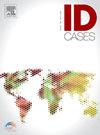A rare encounter: Fusarium falciformis and the challenges of ocular infection in the context of biologic therapy
IF 1
Q4 INFECTIOUS DISEASES
引用次数: 0
Abstract
This case report presents a patient with exogenous endophthalmitis caused by Fusarium falciformis, highlighting the risks associated with immunosuppressive therapy using Adalimumab for rheumatoid arthritis. The patient's compromised immune system, likely exacerbated by gardening exposure, facilitated the fungal infection, marking the first documented instance of Fusarium-related endophthalmitis linked to Adalimumab. Fusarium species are prevalent in the environment but are infrequently recognized as pathogens in humans, particularly in immunocompromised individuals. The differentiation between infectious and non-infectious ocular inflammation poses a significant challenge for clinicians. In this case, early involvement of ophthalmology was critical, leading to effective treatment strategies. Notably, in vitro testing revealed unexpected sensitivity of the isolated Fusarium strain to amphotericin B, which, combined with posaconazole, proved beneficial when combined with intravitreal injections of amphotericin B. This underscores the importance of tailored therapeutic approaches for rare ocular fungal infections and the necessity for increased awareness among healthcare providers regarding potential ocular adverse effects of biologic therapies. Ultimately, this case serves as a vital reminder of the complexities in managing ocular infections in patients receiving immunomodulatory treatments, advocating for vigilant assessment and prompt intervention to preserve vision.
罕见的相遇:镰状镰刀菌和眼部感染的挑战在生物治疗的背景下
本病例报告提出了由镰状镰刀菌引起的外源性眼内炎患者,强调了使用阿达木单抗免疫抑制治疗类风湿关节炎的风险。患者的免疫系统受损,可能因园艺暴露而加剧,促进了真菌感染,标志着与阿达木单抗相关的镰刀菌相关性眼内炎的第一个记录实例。镰刀菌在环境中普遍存在,但很少被认为是人类的病原体,特别是在免疫功能低下的个体中。感染性和非感染性眼部炎症的区分对临床医生提出了重大挑战。在这种情况下,早期介入眼科是至关重要的,导致有效的治疗策略。值得注意的是,体外测试显示分离的镰刀菌菌株对两性霉素B具有意想不到的敏感性,与泊沙康唑联合玻璃体内注射两性霉素B证明是有益的。这强调了针对罕见的眼部真菌感染定制治疗方法的重要性,以及提高医疗保健提供者对生物疗法潜在的眼部不良反应的认识的必要性。最终,该病例提醒我们在接受免疫调节治疗的患者中管理眼部感染的复杂性,提倡警惕评估和及时干预以保护视力。
本文章由计算机程序翻译,如有差异,请以英文原文为准。
求助全文
约1分钟内获得全文
求助全文

 求助内容:
求助内容: 应助结果提醒方式:
应助结果提醒方式:


